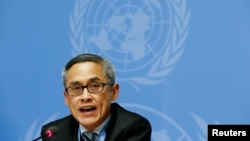Foreign Minister Prak Sokhonn defended Cambodia’s democratic standing and the arrest and conviction of political and rights activists during his first meeting with U.N. special rapporteur Vitit Muntarbhorn.
The Foreign Ministry released a statement detailing the online meeting on Thursday. Apart from discussing regional cooperation and the COVID-19 situation, Prak Sokhonn justified the charging of activists and members of the political opposition as the implementation of the rule of law.
“Charges brought before the courts involve criminal and constitutional breach. The defendants have full opportunity to be heard and to disprove the indictment as part of the rights to due process,” he added.
Muntarbhorn has also met with the interior, health, social affairs, justice, and veterans’ affairs ministers, before the presentation of his report on Cambodia at the Human Rights Council.
The special rapporteur on Friday said he discussed a broad array of issues during his meetings, including prison overcrowding, the socio-economic impacts of the COVID-19 pandemic, and harmonizing the country’s laws with international human rights standards.
“I also raised the situation of civic and democratic space in which I encouraged Cambodia to respect the rights to defend human rights and the environment,” Muntarbhorn said in an email.
Muntarbhorn added a spirit of “mutual respect and openness” was expressed during his meetings, calling on the government to implement human rights recommendations it accepted during the Universal Periodic Review process.
Vitit Muntarbhorn is a professor emeritus at Chulalongkorn University in Thailand. He has helped the United Nations on a range of rights issues, including LGBTQ, labor, children’s, and sexual rights.
From 2004 to 2010, he was the first U.N. Special Rapporteur on the Human Rights Situation in North Korea but never entered the country since Pyongyang does not recognize the mandate of the U.N. envoy to observe them.
Am Sam Ath, deputy director at rights group Licadho, said Cambodia’s deteriorating human rights situation has impacted its trade benefits.
“If Cambodia does not consider improving the situation and democracy, there will be no benefits and Cambodia will start to gradually lose benefits bit by bit,” he said.
He expressed concerns should the U.S. decided to take away Generalized Scheme of Preferences privileges, which would exacerbate the effects felt from the partial revocation of the EU’s “Everything But Arms” trade scheme.
Justice Ministry Spokesperson Chin Malin said Muntarbhorn should respect Cambodia’s “sovereignty and independence” in his dealings with the country.
“There are some points that we have agreed on but some others we have disagreed on, and perhaps it is because of our different thoughts or maybe [because] of different sources of information,” he said.







